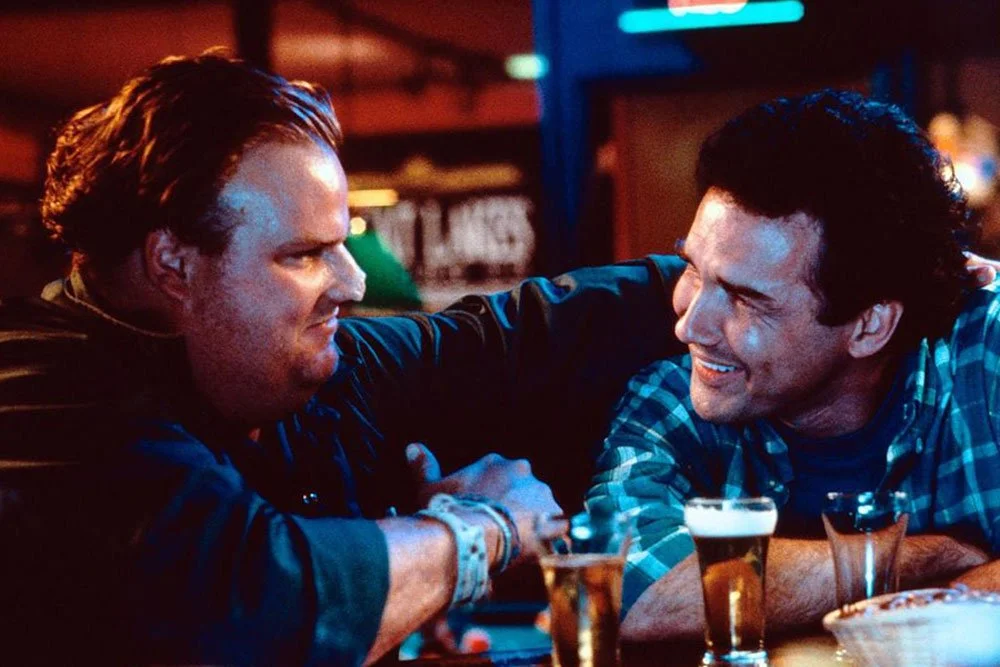#61: Dirty Work
Release Date: June 12th, 1998
Format: Streaming (Tubi)
Written by: Norm Macdonald, Frank Sebastiano, and Fred Wolf
Directed by: Bob Saget
3 Stars
I wish Hollywood still made crummy little movies, and I mean that in the best way possible. Dirty Work is a crummy little movie. It doesn’t look very good, the beats are a little off (apparently the studio insisted on a PG-13 cut, very much in opposition to the rumored hard R-rating that was scripted and shot), and the performances are inconsistent (and that’s putting it mildly).
But to understand Dirty Work, you must understand Norm Macdonald.
Norm Macdonald is, if nothing else, a completely subversive performer. I’ve been a Norm fan for my entire adult life, and I’m confident in saying that his subversiveness is a defining trait. If he for one second gets a whiff that something is sacred, precious, or esteemed, he makes it a point to immediately undercut and deflate said thing.
A quick aside of two Norm anecdotes that I’ve collected over the years:
The first is from Jim Breuer, who told a story of going to Des Moines, Iowa for the Iowa State Fair in the late ‘90s and opening for Norm. The way Breuer tells it, there are thousands of people in the audience and somebody backstage gives strict instructions to them both that they are supposed to have a completely clean act. No cursing, no immoral material, nothing blue. For God’s sake, the crowd is full of good, Christian, Iowan families. So Breuer goes out and does 15 minutes of his best clean material and kills. Big laughs, leaves the stage to an appreciative crowd. Up next comes Norm, and according to Breuer, Norm opens with something along the lines of, “Gay sex seems weird, doesn’t it? I mean the sex stuff sounds good if you’re the guy fucking, but who wants to be the ass guy? I mean, you’re getting violently fucked in the ass while your buddy, he’s behind you just having a great ol’ time? I’d definitely prefer to not be the ass guy.” Huge swaths of Iowans immediately exit the building, and by the end of Norm’s set there are only a hundred or so hardcore Norm fans left.
The second anecdote is more well-known, and involves Norm’s complete devotion to openly mocking OJ Simpson, to the detriment of his own comedy career. One of Simpson’s closest friends, Don Ohlmeyer, was President of NBC during Norm’s time on SNL and ultimately got Norm fired from his stint hosting “Weekend Update” because Norm refused Ohlmeyer’s orders to stop ridiculing Simpson each Saturday. After Norm was fired, ESPN decided to offer him a job hosting the ESPYs, a silly sports award show they used to do (or still do? Are ESPY’s still a thing?). Anyway, during his opening monologue, Norm is congratulating Charles Woodson for winning the Heisman Trophy that year, an accomplishment “that no one can ever take away from you [pause, sly Norm smile, clearly relishing the moment]. Unless you kill your wife and a waiter, then all bets are off.” The camera then shows a bewildered Ken Griffey Jr. shaking his head and there are audible groans heard from the audience.
It came out later that even after firing Norm from SNL, Ohlmeyer refused to run any ads for Dirty Work on any of the NBC affiliates and did his best to squash the movie from behind the scenes.
It’s this understanding of Norm, this subversiveness that possesses him, that is needed to appreciate Dirty Work and to laugh at Dirty Work. He’s not going to take acting seriously, he’s not going to take comedy feature film tropes seriously, and he’s not going to dress up for you or go out of his way to make something look cinematic. He’s the anti-Chaplin. Chaplin wanted his audience to leave “with a smile, and perhaps, a tear.” Norm wants 10% of the audience to join him in his meta-comedy-cinematically-nihilistic headspace while laughing at the stupidity of the medium, and he doesn’t care much at all about appeasing the other 90%. For them, a Hugh Grant comedy is probably playing in the theater next door.
But what do we make of Dirty Work’s rampant homophobia? Norm’s script mocks male homosexuality, and it’s pretty glaring as seen in 2024, and possibly problematic. I suppose this opens up a larger conversation in regards to the responsibility of comedians. It’s my opinion that a comedian’s only job is to generate laughs. They are not beholden to any notion of social justice or equity or fairness; the goal is laughs. And if a comedian is “crossing lines” and hurting the audience’s feelings, they’ll stop laughing. That’s the marker of a comedian “going too far.” It’s quantitative, not qualitative (the number and volume of laughs go down; it shouldn’t have anything to do with assessing the quality of the comedian’s morality behind the jokes).
I don’t think Norm hates male homosexuals (in fact, Norm’s character Mitch is implied to be gay and is embarrassed that he’s sexually attracted to Sean Connery). When Mitch is gang raped in prison, his reaction is to give his attackers a stern talking to: “You fellas have a lot of growing up to do, I’ll tell you that. Ridiculous. Completely ridiculous.”
In my opinion, this is Norm in the meta space. It’s 1998 and (thankfully) homosexuality is beginning to be widely accepted by mainstream America. Hollywood is just starting to release more queer film to mainstream theaters (not that they give a shit really about representation, or at least they won’t sacrifice box office for it). It’s just becoming more profitable and more hip. The winds are changing. And there’s Norm, grinning, walking into the wind.
So if you’re into potentially problematic comedies that don’t look very good and aren’t well acted, boy, does Norm have a movie for you. Go ahead and laugh if you want. Norm dares you to.
